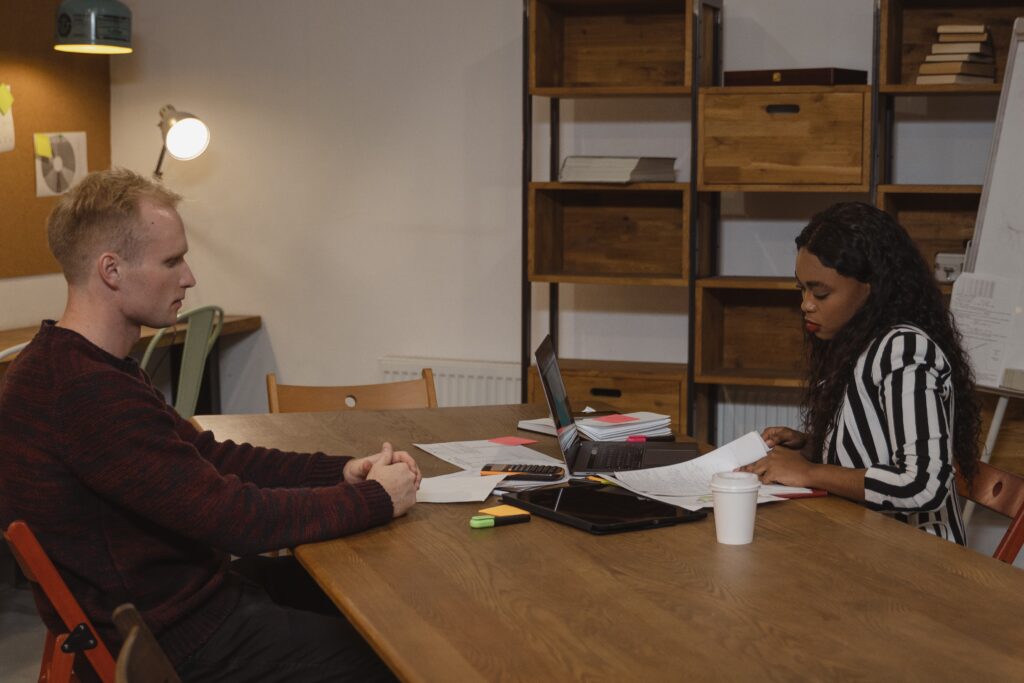Have you ever found yourself in the shoes of a seemingly ideal job candidate, eagerly pursuing your dream job, only to be left disappointed after a series of unsuccessful interviews? It’s a classic heartbreaker in the world of job hunting – having all the right qualifications and experiences, yet still not making it through the interview process. If you’ve experienced this frustrating pattern repeatedly, you’re not alone.
While each company has its own unique set of recruitment criteria, there are 7 interview mistakes that even the most qualified candidates can unwittingly stumble into. In this blog, I’ll give you five costly interview blunders that could be sabotaging your chances of success when it comes to securing that new position.

Photo Courtesy by Tima Miroshnichenko via Pexels
Dwell too much on your career history.
It’s understandable to get carried away when discussing your career journey. You might feel the need to explore every job in excruciating detail, even the most obscure ones, and delve into technical specifics that your interviewer might not fully grasp, leading to disengagement on their part. Instead of overwhelming your interviewer, it is essential to take a more balanced approach. Highlight the experiences that directly relate to the job you’re interviewing for and tailor your responses to the role’s requirements. Focus on how your history aligns with the future position.
Follow these tips to avoid over-focusing:
- Concentrate on roles and achievements that directly tie into the job you want.
- Showcase how your past experiences have made a difference.
- Emphasize how your skills and history position you for success in the future.
Use inappropriate language and jargon.
Using fancy words or phrases that only experts in your job field would get during an interview can be a bit tricky. Here’s why: it can make it tough for the person interviewing you to really get what you’re saying, and that can lead to some misunderstandings. Plus, if you talk too casually or not professionally, it might make it seem like you’re not taking the interview seriously, and that’s not a good impression to leave. And here’s another thing to think about – if you use a lot of fancy words that the interviewer doesn’t understand, it might make them feel a little lost, like they’re not in the conversation.
Tips for Effective Communication During an Interview:
- Express your thoughts in a straightforward manner. Avoid unnecessary complexity or jargon. Imagine explaining your ideas to someone who knows nothing about your industry.
- Adapt your language to the interviewer’s level of familiarity with your field. Start with simple explanations and gauge their comprehension before delving into technical details.
Over-practice interview answers
When you’re getting ready for a job interview, it’s important to prepare, but you shouldn’t practice your answers too much. If you do, your responses might sound like they’re coming from a script, which is a problem because interviewers like it when you’re genuine and sincere. Over-rehearsing can also make your answers feel less natural and enthusiastic, which is something interviewers like to see. Plus, if you rehearse too much, you might have trouble coming up with answers on the spot if the interviewer asks something unexpected. So, instead of memorizing your answers word for word, it’s better to understand the main points you want to talk about. This way, you can have a more natural and engaging conversation during the interview, which is what interviewers prefer.
Tips to Avoid Over-Rehearsing:
- Outline key points you want to cover, allowing for flexibility in your responses.
- Seek feedback from someone you trust to provide constructive criticism.
- During the interview, listen to the questions carefully and respond genuinely, rather than

Photo Courtesy by Edmond Dantès via Pexels
Being arrogant and entitled
When you find yourself coming across as arrogant or entitled during an interview, it’s important to recognize the potential negative consequences of such behavior. If you come across as overly confident to the point of dismissiveness, you may unintentionally ignore the interviewer’s questions or concerns, leading to misunderstandings and missed opportunities to effectively showcase your qualifications.
Strategies for Confidence Without Arrogance:
- Pay close attention to the interviewer’s questions and concerns. Show that you value their input and are open to collaboration.
- Acknowledge the contributions of colleagues and teams in your achievements.
- If asked about weaknesses or areas for improvement, provide thoughtful responses that demonstrate your self-awareness and commitment to growth.
- Express your interest in the position and the company with genuine enthusiasm rather than assuming entitlement.
Disconnecting from mission and culture
The company’s mission is like its guiding star. It tells everyone what the company stands for and what it’s trying to achieve. Culture, on the other hand, is like the atmosphere at work – how people interact, work together, and what it’s really like day to day. Knowing about these things is not just a small detail; it’s like a sneak peek into your future job satisfaction. Now, if you don’t really get what the company is all about, it becomes pretty obvious. You might struggle to explain what they’re trying to do, or you might not understand how things work there. So, before your next interview, do your homework on these things – it could make all the difference.
Strategies to Connect:
- Dive deep into the company’s mission and values. Understand what drives them, and figure out how you align with those principles.
- Reach out to current or former employees. Their experiences can provide valuable insights into the company’s culture and whether it’s a good fit for you.
- During the interview, show how your values and career goals align with the company’s mission and culture.
Overlooking the basics.
Starting with the simple stuff, there are some common mistakes you should definitely avoid. First, being late is a big no-no. It tells the interviewer that you might not be dependable or take the job seriously. Second, dressing inappropriately can create a bad impression. It’s like going to a fancy party in your pajamas – it just doesn’t work. Lastly, acting unprofessionally during the interview can make you seem unqualified for the job.
Now, why are these things so important? Well, think of first impressions as the “hello” of your interview. They set the tone for the whole conversation. If you mess up these basics, it’s like stumbling right at the start of a race – it’s tough to recover and make a good impression afterward.
Tips to Avoid Overlooking Basics:
- Make sure you have the interview time and place clear in your mind.
- Research the company’s dress code and aim to match it or dress slightly more professionally.
- Show respect, courtesy, and professionalism in all your interactions during the interview.
Uncertain about why you excel in your role.
So, why is this self-awareness stuff so crucial? Well, think of it like having a map for your career. When you know what you’re good at and can talk about it, you become more confident. And confidence can make a big difference in job interviews. Plus, it helps you make smart choices about your career path.
But what if you’re not so sure about your strengths? Well, that can be a problem. It shows when you have trouble talking about what you’re good at or can’t explain how your past experiences make you a great fit for the job. And here’s the thing – interviewers notice these uncertainties, and it might hurt your chances of getting the job. It boosts your confidence, helps you make the right career choices, and leaves a good impression on interviewers.
Strategies to Enhance Self-Awareness:
- What did you excel at, and where did you learn the most?
- Seek feedback from people you trust, like mentors or colleagues. They can help you see your strengths and areas for improvement.
- Practice explaining your strengths and achievements to others. The more you talk about them, the clearer they become.
To wrap up, jobseekers need to remember all the small but important steps involved in the interview process. Taking time to think through your career history, practicing with more than just key phrases and questions, understanding the culture and mission of the organization you are interviewing, and being prepared to explain why you excel in your current role are all essential components of making a great impression. Doing so will truly get you one step closer to landing that job you have always dreamed of. It is not always easy and often takes practice, but don’t give up! Take every opportunity you can to network, practice your skill set, and research companies that align with what makes you tick. With some preparation, commitment and self-confidence you will be sure to get noticed in an interview. The success is yours for the taking! Go get ‘em!
Ready to boost your interview success and take your career to the next level? Whether you’re looking to fine-tune your interview skills, gain confidence, or address specific challenges, our tailored coaching and training programs are here to support you. Don’t miss out on this opportunity to invest in your future. Book your schedule now, and let’s work together to unlock your full potential and secure the job of your dreams!

